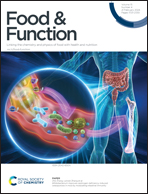Preparation and characterization of Antarctic krill oil/quercetin co-loaded liposomes and their protective effect on oleic acid-induced steatosis and oxidative stress in vitro†
Abstract
This study aims to introduce a new liposome to co-load Antarctic krill oil (AKO) and quercetin (QC) as a new delivery formulation to enrich the application of AKO and QC. The stability of liposomes could be increased by adding an appropriate quantity of soy lecithin (SL). Changes in the composition of the phospholipid membrane were strongly correlated with the stability and release capacity of loaded nutrients. SL2@QC/AKO-lips displayed a nearly spherical shape with higher oxidative stability and controlled the in vitro release performance of QC in simulated digestion. Moreover, in vitro studies indicated that new liposomes had no adverse effects on cell viability and could combine the physiological functions of AKO and QC to protect the HepG2 cells from oleic acid-induced steatosis and oxidative stress. The findings demonstrated that the AKO and QC co-loaded liposomes prepared with the addition of an appropriate quantity of SL had excellent loading efficiency of AKO/QC and good oxidative stability, security and functional activity.



 Please wait while we load your content...
Please wait while we load your content...